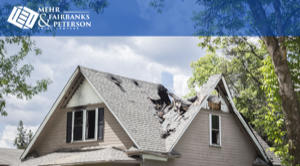
When a homeowners insurance company wrongfully denies or unreasonably delays payment of a valid homeowners insurance claim, it is called acting in “bad faith.” Your homeowners insurance policy is a contract between you and the insurance company. That contract creates a special relationship between you and your homeowners insurance company that requires them to act in good faith in their dealings with you. When they play games with your valid homeowners insurance property damage claim, they are acting in bad faith.
If your homeowners insurance company has recently denied your homeowners insurance claim or cancelled your policy, below are some answers as to why and how our homeowners insurance lawyers can help.
- What is covered by a homeowner’s policy? What is and is not covered by a homeowner’s policy depends on the terms of the policy itself. Generally, the policy will cover certain “perils” such as fire or storm damage and will pay for the “losses” associated with those perils, such as the cost of making repairs. Most policies cover the actual cost of the repairs unless the home is a total loss (the cost of repairs exceeds the value of the home). Some policies provide for payment on an “actual cash value” basis unless and until the repairs are actually made, at which time the policy provides for “replacement cost.”
- Can a homeowner’s insurance company deny a claim made on the policy? Homeowners insurance companies regularly deny claims made on their policies. If the claim could be one covered by the terms of the policy, then the insurance company should investigate the facts which support it. The insurance only covers the losses outlined in the policy. Most policies have exclusions. These are types of losses which are not covered. There can also be exceptions to exclusions. Though insurance policies should be clear, many are not. What is covered and what is excluded can be difficult to determine even if the policy is written clearly. In addition, there are certain conditions which must be met before an insurance company has a duty to pay even a covered claim. For example, the insurance company may require the insured to provide proof of loss. A homeowner’s insurance lawyer can help navigate the confusing language in a homeowner’s insurance policy.
- Can a homeowner’s insurance policy be cancelled at any time? A homeowner’s insurance policy is a contract. When and how a policy can be cancelled by you or your insurance company is generally set forth under the terms of the policy. Generally, you can cancel your homeowner’s insurance policy at any time, and you may receive a portion of your unearned premium in return. If you have a mortgage on your home, you should be careful that your coverage does not lapse and that your home is continually covered as that could be a default under your mortgage. Generally, under your policy, your insurer must give you advance notice of its cancellation. You would also be entitled to refund of any unearned premium. An insurance company typically does not have to renew your policy once it expires, and it doesn’t have to have a reason not to renew it.
If an insurance company has acted in bad faith on your homeowners insurance claim, an experienced homeowners insurance lawyer can evaluate your case and tell you what monetary damages you are entitled to under your policy. But, generally, you are entitled to the benefits of the policy, any additional damages that you have suffered because of their bad faith and, in some cases, punitive damages to punish the insurance company.
Call us, or request a free claim evaluation today. We are here to help.
 Kentucky ERISA Disability & Life Insurance Claim Lawyers
Kentucky ERISA Disability & Life Insurance Claim Lawyers

